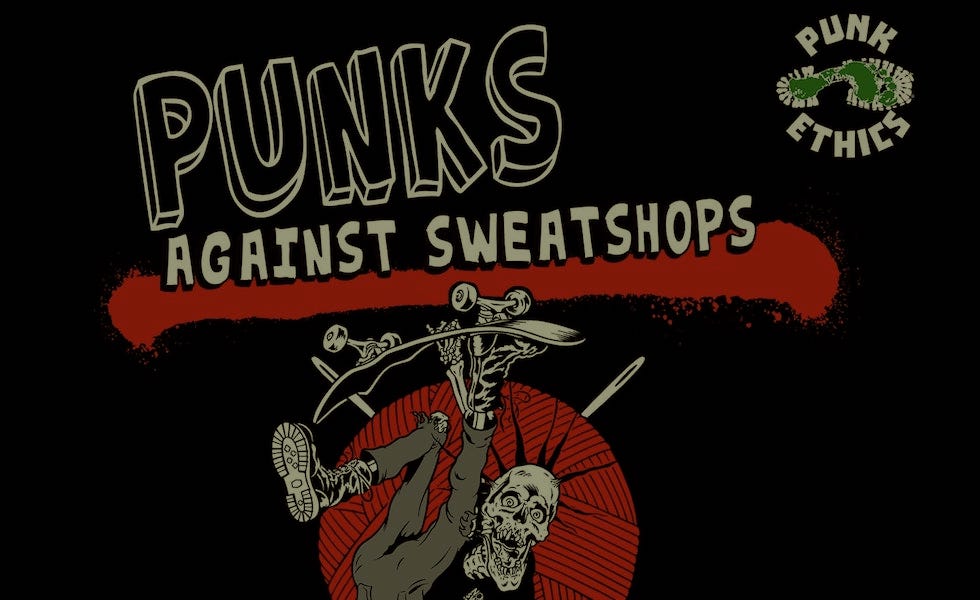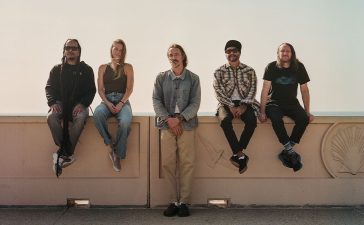Band merchandise has more purposes than being purely promotional. Wearing a band T-shit can simultaneously give the wearer their unique identity while also identifying their unique community. They can be the ultimate ice-breaker, and a big, bold billboard for like-minded humans. But there is a dark side to band merch, one that UK-based organisation Punk Ethics aims to shine a light on.
The reality is, a shocking amount of band merch is made in sweatshops, put together by exploited workers tasked with back-breaking KPI’s and rewarded with devastatingly low wages in skin-crawling conditions. It’s a symptom of capitalism but in cahoots with No Sweat, Punk Ethics have put forward a cure with their Punks Against Sweatshops campaign.
But first, a conversation needs to be had – one that isn’t angled towards blame, after all, we’ve all contributed to this system, but instead angled towards a better way to move forward.
Walk me through the origin story. What was the situation that resulted in Punk Ethics coming together?
Although we are a London-based collective, our story actually traces its roots back to Australia.
Throughout the 00s I’d been organising regular punk gigs with friends in London as benefit shows for an anti-sweatshop campaign group called No Sweat. Then in 2012 I moved to Sydney. I got involved in the anarchist bookshop Jura Books which led to me being heavily involved in organising the first Sydney anarchist bookfair at the Addison Road Community Centre in 2014, with a punk gig after.
When I returned to London in 2015, after the amazing anarchist bookfair experience and a bit of travelling meeting punks in Asia, I was looking to do more politically experimental stuff in the punk scene; stuff that was politically progressive in the way that anarcho-punk is, stuff that would be cheeky, make people think and push at the boundaries of society the way that punk originally had. Punk Ethics was born!
Since then, we have organised a couple of protest gigs on the beach of the River Thames, called Trespass, with the political comedian, Mark Thomas, and some iconic bands like Oi Polloi and Conflict, that were protesting against gentrification and Boris Johnson’s corrupt Garden Bridge project.
But our biggest project so far has been the Punks Against Sweatshops campaign.
Tell me about the scope of the issue: What has your research shown you about the extent of the issue of sweatshops being used to create band merch?
Sweatshops are ubiquitous. The fact the that the band merchandise industry is as much a part of the system of exploitation as a big name brand like Nike. The global garment industry is totally dependent on sweatshop labour, regardless of what the major brands might say about their sustainability goals or their ethical fashion, the reality is the garment industry is built on low paid labour in poorer countries where workers often work in dangerous conditions, with high production targets and threats of intimidation and violence from management. This has been well established by campaign groups around the world.
T-shirts are a major part of the music industry. All bands will print their logo on T-shirts to sell at their shows. These T-shirts come from wholesale blank T-shirt manufacturers like Gildan and Fruit of the Loom, and they are produced in the same factories that make clothes for the major brands. They get much less attention as it is not as visible, but the fact is when a band sources their merch from a supplier that uses the large blank garment brands, they are perpetuating the same system of exploitation in developing countries.
Often it’s so difficult to find hard facts about serious social issues such as sweatshops, how did you conduct your research, and what are some examples of case studies you discovered?
As a small punk campaign we rely heavily on the work of bigger campaign groups in this field. Organisations like Clean Clothes Campaign and the Workers Rights Consortium that publish a lot of information about sweatshops in developing countries. Then there is the ILO that is the UN body that oversees workers rights. For all their faults they do provide good information on the conditions of the garment industry.
No Sweat takes the view that it is up to workers in sweatshops to fight for their rights, and that people in the West can help them by showing global solidarity and helping to raise the workers’ voice. It is important to remember that garment workers aren’t passive victims, they are people that are prepared to stand up and fight for their rights. So, No Sweat makes contact with a lot of garment workers’ trade unions in countries where sweatshops are common, such as Bangladesh and Myanmar.
It is through these connections that we heard about the recent situation in Haiti, where the workers organisation there, called Batay Ouvriye, organised a massive demonstration of thousands of garment workers over the low wages they receive.
It turns out they were earning as little as US$5 (around AUD$7) per day which was far too little to live on – a living wage in Haiti is calculated at US$17 (around AUD$24) per day, so the protests were calling for a living wage. It turns out one of the biggest customers to the garment factories of Haiti is the wholesale blank T-shirts company, Gildan. This is one of the biggest blank T-shirt companies in the world, their T-shirts are used for band merch across the US, Europe and Australia, and the Haitian workers that are making these T-shirts are earning poverty wages.
What’s shocked you the most about what you’ve learnt so far?
There are lots of things that are shocking when it comes to sweatshops. In 2013 a multi-storey building housing a number of garment factories making clothes for major brands, collapsed, killing well over a thousand people. This came to be known as the Rana Plaza disaster. The brands involved all make claims to be ethical, with their own codes of conduct and inspection programs, but their negligence led to the deaths of so many, and most of the brands refused to accept any responsibility.
Then there are many reports of gender-based violence in the garment industry, with incidents of verbal abuse, physical abuse and sexual harassment shockingly common. In some extreme instances there has even been reports of rape and murder. For example, last year the Justice for Jeyasre campaign was launched following the murder of Jeyasre Kathiravel, a garment worker in India, who was organising in her trade union to fight gender-based violence. She had experience months of sexual harassment from her supervisor until he finally killed her. Jeyasre was working in a factory making clothes for H&M. A campaign I am pleased to say had some success in getting H&M to take action.
These are just some of the shocking examples, but the biggest shock is the lack of action by the major brands that hold all the economic power. They earn millions, even billions in profits but are unable to keep the people making their clothes safe.
What’s been some of the feedback you’ve received so far, from both bands and those impacted most by the sweat-shop system, the workers – What keeps you going in such a dire fight?
We launched the campaign with a short video we made that featured some big names in the punk scene such as Jello Biafra, Penny Rimbaud and Steve Ignorant from Crass, and Jord from Propagandhi. Having those big names helped us reach a much wider audience. We received emails from punks all around the world expressing their solidarity with the campaign, and lots of punks wanted to translate it into their own language, so we now have subtitled versions in about 10 languages.
From the workers perspective we have less info – the trade unions that No Sweat is in contact with have little knowledge of the punk scene, so there is not much reaction to our little project, but at the end of the day our aim was to raise awareness of the issue in the global punk scene and kick start a conversation.
As Deek from Oi Polloi says in the film, bands sing about social justice and a better world, but then print their logo on a sweatshop made T-shirt, it’s a complete contradiction. But we don’t want to alienate people here, we are all guilty of that contradiction, as I said sweatshops are ubiquitous, they are everywhere so it’s hard to avoid it – but we need to start having the conversation and making an effort to change things. The punk scene is one music scene that puts social justice at its very core, so it is up to the punk scene to take the lead and get that conversation going.
How can bands and musicians be more conscious? It might be a bit basic, but is there perhaps a checklist they can use when shopping for merch options?
Unfortunately it’s not that simple. Over the past 20 years there has been a lot of work put in by the garment industry to be seen to clean up their act. There are numerous little logos that brands use to say how ethical and sustainable their clothes are, accreditations that are designed to give consumers confidence that their T-shirt isn’t sweatshop made – but for the most part this is just whitewashing or greenwashing. A recent report by a group called MSI Integrity came to the conclusion, after investigating these accreditation bodies for 10 years, that they are not fit for purpose.
This means that musicians need to go the extra mile to find out where to source their clothes. Groups like No Sweat have made an effort to set up projects where people can buy T-shirts are made in decent conditions, for decent wages, essentially acting as an example of how the industry can operate; and it is possible to find workers co-operatives like Dignity Returns in Thailand, that was set up be ex-sweatshop workers, to source T-shirts from where you know the conditions are decent. It’s important to do your research and not just trust the big corporations and their little accreditation logos.
But more importantly, musicians have a platform where they can raise awareness of these issues, they can collaborate with campaigns that are supporting garment workers trade unions in developing countries and help turn people on to the situation. The more awareness that is raised, the more pressure can be put on the brands with the economic power to change the industry – to pay a living wage, to help fund improvements in factory conditions, to ensure there is no place for gender-based violence. These are the changes we need to see in the whole industry, not just a few factories that are trying to do the right thing.
Australian bands might be all the way over the other side of the planet, but how can we do better when it comes to ethical merch production?
It all starts with a conversation. If you are a DIY band sourcing T-shirts you can join forces with other bands and talk with local screen printers about sourcing ethical T-shirts. You can chip in to buy a larger order from a group like No Sweat – or an Australian equivalent, or place a bulk order with a factory like Dignity Returns or some other co-op you may find out there. Then shout about it, so your fans know where your T-shirts come and why.
If you are a bigger band that has contacts with merch companies, then have the conversation with them about where the T-shirts come from, who makes them and in what conditions. You can insist on a union-made T-shirts and ask the merch company to source it.
In Australia there is APHEDA that provides trade union aid abroad. They would be an important source of information about conditions in the garment factories overseas and what Australia’s connection is to different trade unions around the world. By insisting on union made this will help develop new contacts in the industry – big bands demanding union-made T-shirts will soon turn into a specific offer a merch company adds to their catalogue, and if those bigger bands talk publicly about why they demand union-made ethical T-shirts, then the conversation will grow.






